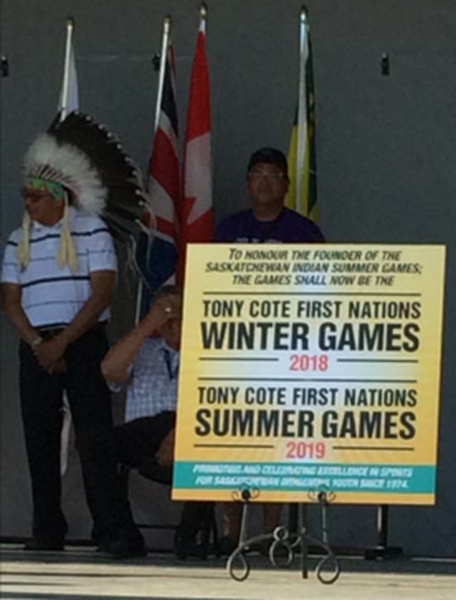A former chief of Cote First Nation is being honoured by the Federation of Sovereign Indigenous Nations (FSIN) by re-naming the Saskatchewan First Nation summer and winter Games as the Tony Cote First Nations Summer Games and the Tony Cote First Nations Winter Games.
The announcement was made during the 2017 Saskatchewan First Nations Summer Games that was hosted by File Hills Qu’Appelle Tribal Council and took place in Regina August 6 to 11 when about 5,000 athletes, coaches, chaperones and officials from 74 Saskatchewan First Nations communities from 10 tribal councils participated.
Open to Saskatchewan First Nations athletes aged 13 to 18 years, the games offer competition in nine sports: archery, athletics, beach volleyball, canoeing, cross-country, golf, lacrosse, soccer and softball.
When while serving as Cote First Nation chief in 1974, Tony Cote founded the Saskatchewan First Nation Summer Games, he had said he had hoped one of the athletes would someday compete at the Olympics.
Over the years, the Summer Games have evolved, increasing the number of athletes, reserve facilities, resources, and volunteers, said the Games’ website. The Summer Games have been instrumental in providing training and experience for athletes to go further, competing in the North American Indigenous Games, Saskatchewan Summer Games and the Olympics.
Approximately 500 athletes participated in the first Summer Games and since 2001, the Games have been held every second year.
Marvin C. Sanderson, Games Co-ordinator in 2013, said that 3,500 athletes were expaect that year.
“The Summer Games is a grassroots development for our First Nations youth to continue their goals in sports,” Sanderson said.
“I always tell them, you’ve got to be a good sport,” Tony Cote said when he presented the Tony Cote Award for the most improved tribal council at the Games.
“Someday, it probably won’t be in my time, but I would like to see more Aboriginal and First Nations people even compete in the Olympics. That was my goal to start off with,” he said.
Tony Cote was the recipient of the Tom Longboat Award in 1974 for outstanding sportsman. He received the Saskatchewan Order of Merit in 2008, was indicted into the Saskatchewan Sports Hall of Fame in 2011 and received the Queen’s Diamond Jubilee Award in April 2013.
Tony Cote has spent a lifetime in service to his community, his province and his country, says information on the website of the Saskatchewan Sports Hall of Fame. “Furthermore, he has shown that sport can serve to elevate not only an individual, but society as a whole.”
First elected as chief of the Cote First Nation in 1970, Cote took the lead on a series of improvements that would benefit the community for years to come, the information said. He initiated construction of a hockey arena with an artificial ice surface—a first among Saskatchewan First Nations. He followed this by establishing the first all-Native Junior ‘B’ Hockey team in Saskatchewan, serving as the club president for the next five years.
From 1974 to 1978, Cote was the manager of the Cote Selects women’s fastball team. During that time, the team competed in tournaments across North America, taking part in the National Indian Activities Association championships in 1977 and 1978.
In 1975, Cote formed the first all-Native Old-Timers hockey team in Saskatchewan. The “Wagonburners” were Saskatchewan East Division champs in 1977 and finished their season at a tournament in Florida.
The significant increase in participation rates of First Nation athletes, as well as the increase in the skill level of those athletes, stands as the true legacy of the Games Cote founded.
At Regina last week, when approximately 3,000 athletes between ages of 13 to 18 competed, Regina Mayor Michael Fougere said the Games were expected to inject millions of dollars into the city's economy and said that its cultural impact was equally important.
"We have a large Indigenous population," said Fougere. "This is a showcase of who we are as a people. And that's important."



